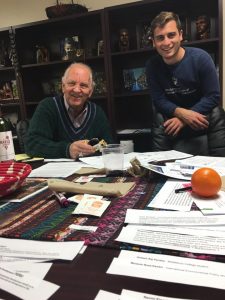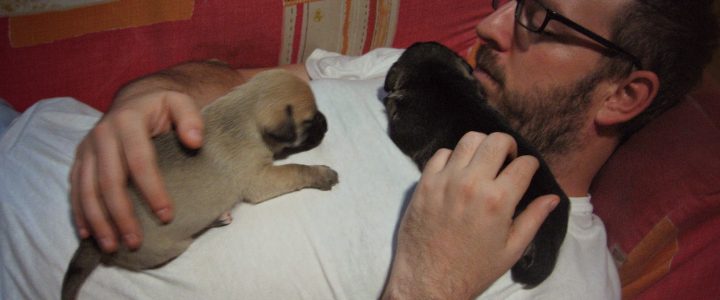
Ben Grimmig (MBA ’17) has worked with Ambassador Corps in the CSIL offices while completing his degree at at the Middlebury Institute. He also participated in the FMS Training as part of the January 2016 cohort, where he found a passion in impact investing. Current Partnerships Associate Christina Lukeman caught up with Mr. Grimmig in Washington, D.C. this summer to hear his thoughts on fair trade, his top mentors in the field (looking at you, Mr. Hildebrand!) and how his love for the environment has optimally affected his trajectory in the impact sector.
Tell us about your current work/position. What are your next steps?
BG: Currently, I am a Mission-MBA intern at Honest Tea. My main responsibility is to write our mission report (kind of like a sustainability report which tracks Honest Tea’s mission-related initiatives over the last 12 months). They use four main metrics: organic purchasing from a pounds-perspective, fair trade purchasing from a pounds-perspective, fair trade premiums generated from a dollar-perspective, and servings sold (this shows scale and scale equals impact—Honest Tea sells more after being bought by Coke). For example: They converted to 100% fair trade sugar (but my role is to demonstrate what that means from a fair trade perspective?)
My next moves are going back to school at MIIS (and working at CSIL!), meanwhile I’ll continue to work at Honest Tea in a project-oriented sense—I’d like to see it my work through to publication of online report and distribution.
In Spring 2017, my plans are to do a FMS placement in Latin America working for an Impact Fund.
What is impact to you?
BG: Impact is giving people the tools so that they can autonomously best improve their community or situations. Obviously, my answer is very influenced by working in fair trade where you pay a premium so that the community can democratically decide what to do with that extra money. In essence, you give people the tools to do what THEY think is best, not necessarily what the money-holder thinks is best for the community.
We are so naïve to think we can step into a new situation and think we can change it, but often times where you can move the needle is not necessarily what is the sexier job position. So, impact from a personal perspective is knowing what you are good and moving [the needle] there. That’s why I love impact funds—you are supporting different grassroots initiatives and letting the community decide how to best allocate capital. Something I would really like to see grow in the impact investing space is improving the lines of communication between the funds and the community so that there is way more community involvement in the decision-making process of allocating funds.
What inspired you into impact?
BG: My trajectory is heavily influenced by the environmental space because I love the outdoors; I wanted my career to be environmentally focused. I thought the best way to get involved was with CSR. A lot of that can be attributed to Adam Werbach – who was the youngest president of the Sierra Club, but later left controversially and went on to consult both non-profit and for-profit companies (like Walmart) on how to green their business. He gave this speech where he said “While there’s a certain activist romance in the David vs. Goliath story, I began to get more comfortable with the odds of working with Goliath in the spirit of a David.” And I think this idea that you could actually work with big companies really influenced me. So I went on to do communications consulting, with a focus on CSR, for large companies. My whole belief system when getting into public relations was that company’s could do well by doing good – that consumers actually seek out environmentally or socially conscious brands (i.e. B-Corps!) – but that brands often fail to communicate their initiatives and therefore miss out on a big opportunity. I wanted to help companies tell their sustainability story. I wrote sustainability reports and other communications assets related to brands’ CSR efforts. Ultimately, while I still firmly believe that business can be a force for good, I was frustrated with my role. I was seeing a company’s environmental or social initiative after it had already been implemented – and my job was to communicate. While, telling a story is very important to in engaging stakeholders with your values, I didn’t always find it genuine and I thought I could have more of an impact if I could get involved earlier in the process of formulating an initiative. That’s what led me back to school. I wanted to get a deeper background in finance and impact investing. I thought if I could get to the source of the money, I could have more influence over social or environmental initiatives in the private sector compared to when I worked in communications and only saw initiatives after they had been implemented. I am now more interested in the finance side – particularly helping smaller enterprises access capital.
How would you describe your FMS experience?
BG: There was never a dull moment. During the experience you are exposed to people from so many backgrounds. The curriculum covered a wide swath of material; the facilitators presented many problems. My favorite part was getting in my group every day and creatively solving those problems. From a networking perspective it is all the people you could hope to see in that space; it made me feel very much in the inner circle.
What did you learn from working with CSIL?
BG: I’ve learned a lot from the individuals who work there. The staff genuinely care about what they do, even “impact” aside and really how to live a good life. They’ve created a family feel in the office. Jerry is a mentor and great example of what I want my work to feel like: he demonstrates the power of relationship in the workplace. I remember walking into SOCAP the first day and I felt like I was walking in with Brad Pitt—everyone wanted a hug from him and he made everyone feel special. The business we do with Ambassador Corps is so relationship-based, so this is essential. Also, I’ve also learned the back-end on how to run a lean-organization: long hours and how to make choices when resource-constrained.

Who has been a “pillar” mentor to you?
BG: First and foremost, Jerry! Also, due to my interest in the private sector, Yvon Chouinard (Founder of Patagonia). But probably the most influential to me has been Adam Werbach, who has the youngest president of the Sierra Club, quit and went to work for Walmart (a nod to the metaphor of David and Goliath). He found that he had more impact working from within. He went onto found Saatchi & Saatchi S (a Public Relations firm focused on sustainability). He, to me, was a defining person that got me into CSR from a communications-perspective.
How has your life changed since getting involved in impact?
BG: I’ve become not so idealistic and more into realistically taking a more holistic approach to business. I’ve taken my focus off solely the environment and become more focused on social issues as well, understanding that impact is interconnected.
Tell us something that no one knows about you.
BG: I was prom king!
Editor’s Note: Ben makes the best homemade chocolate chip cookies I’ve ever tasted—and yes, I realize that is a big statement.




